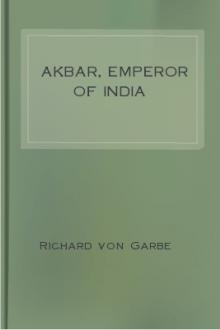Akbar, Emperor of India - Richard von Garbe (top 10 books to read txt) 📗

- Author: Richard von Garbe
- Performer: -
Book online «Akbar, Emperor of India - Richard von Garbe (top 10 books to read txt) 📗». Author Richard von Garbe
Mâhum Anâga, the Emperor's nurse, for whom he felt a warm attachment and gratitude, a woman revengeful and ambitious but loyal and devoted to Akbar, had contributed in bringing about the fall of the regent. She had cared for the Emperor from his birth to his accession and amid the confusion of his youth had guarded him from danger; but for this service she expected her reward. She sought nothing less than in the rôle of an intimate confidante of the youthful Emperor to be secretly the actual ruler of India.
Mâhum Anâga had a son, Adham Chân by name, to whom at her suggestion Akbar assigned the task of reconquering and governing the province of Mâlwâ. Adham Chân was a passionate and violent man, as ambitious and avaricious as his mother, and behaved himself in Mâlwâ as if he were an independent prince. As soon as Akbar learned this he advanced by forced marches to Mâlwâ and surprised his disconcerted foster-brother before the latter could be warned by his mother. But Adham Chân had no difficulty in obtaining Akbar's forgiveness for his infringements.
On the way back to Agra, where the Emperor at that time was holding court, a noteworthy incident happened. Akbar had ridden alone in advance of his escort and suddenly found himself face to face with a powerful tigress who with her five cubs came out from the shrubbery across his path. His approaching attendants found the nineteen year old Emperor standing quietly by the side of the slaughtered beast which he had struck to the ground with a single blow of his sword. To how much bodily strength, intrepidity, cold-blooded courage and sure-sightedness this blow of the sword testified which dared not come the fraction of a second too late, may be judged by every one who has any conception of the spring of a raging tigress anxious for the welfare of her young. And we may easily surmise the thoughts which the sight aroused in the minds of the Mohammedan nobles in Akbar's train. At that moment many ambitious wishes and designs may have been carried to their grave.[6]
The Emperor soon summoned his hot-headed foster-brother Adham Chân to court in order to keep him well in sight for he had counted often enough on Akbar's affection for his mother Mâhum Anâga to save him from the consequences of his sins. Now Mâhum Anâga, her son and her adherents, hated the grand vizier with a deadly hatred because they perceived that they were being deprived of their former influence in matters of state. This hatred finally impelled Adham Chân to a senseless undertaking. The embittered man hatched up a conspiracy against the grand vizier and when one night in the year 1562 the latter was attending a meeting of political dignitaries on affairs of state in the audience hall of the Imperial palace, Adham Chân with his conspirators suddenly broke in and stabbed the grand vizier in the breast, whereupon his companions slew the wounded man with their swords. Even now the deluded Adham Chân counted still upon the Emperor's forbearance and upon the influence of his mother. Akbar was aroused by the noise and leaving his apartments learned what had happened. Adham Chân rushed to the Emperor, seized his arm and begged him to listen to his explanations. But the Emperor was beside himself with rage, struck the murderer with his fist so that he fell to the floor and commanded the terrified servants to bind him with fetters and throw him head over heels from the terrace of the palace to the courtyard below. The horrible deed was done but the wretch was not dead. Then the Emperor commanded the shattered body of the dying man to be dragged up the stairs again by the hair and to be flung once more to the ground.[7]
I have related this horrible incident in order to give Akbar's picture with the utmost possible faithfulness and without idealization. Akbar was a rough, strong-nerved man, who was seldom angry but whose wrath when once aroused was fearful. It is a blemish on his character that in some cases he permitted himself to be carried away to such cruel death sentences, but we must not forget that he was then dealing with the punishment of particularly desperate criminals, and that such severe judgments had always been considered in the Orient to be righteous and sensible. Not only in the Orient unfortunately,—even in Europe 200 years after Akbar's time tortures and the rack were applied at the behest of courts of law.
Mahum Anâga came too late to save her son. Akbar sought with tender care to console her for his dreadful end but the heart-broken woman survived the fearful blow of fate only about forty days. The Emperor caused her body to be buried with that of her son in one common grave at Delhi, and he himself accompanied the funeral procession. At his command a stately monument was erected above this grave which still stands to-day. His generosity and clemency were also shown in the fact that he extended complete pardon to the accomplices in the murder of the grand vizier and even permitted them to retain their offices and dignities because he was convinced that they had been drawn into the crime by the violent Adham Chân. In other ways too Akbar showed himself to be ready to grant pardon to an almost incomprehensible extent. Again and again when an insubordinate viceroy in the provinces would surrender after an unsuccessful uprising Akbar would let him off without any penalty, thus giving him the opportunity of revolting again after a short time.
It was an eventful time in which Akbar arrived at manhood in the midst of all sorts of personal dangers.
MAUSOLEUM OF AKBAR'S FATHER, HUMÂYUN.
I will pass over with but few comments his military expeditions which can have no interest for the general public. When Akbar ascended the throne his realm comprised only a very small portion of the possessions which had been subject to his predecessors. With the energy which was a fundamental characteristic of his nature he once more took possession of the provinces which had been torn from the empire, at the same time undertaking the conquest of new lands, and accomplished this task with such good fortune that in the fortieth year of his reign the empire of India covered more territory than ever before; that is to say, not only the whole of Hindustan including the peninsula Gujerat, the lands of the Indus and Kashmir but also Afghanistan and a larger part of the Dekkhan than had ever been subject to any former Padishah of Delhi. At this time while the Emperor had his residence at Lahore the phrase was current in India, "As lucky as Akbar."[8]
It was apparent often enough in the military expeditions that Akbar far surpassed his contemporaries in generalship. But it was not the love of war and conquest which drove him each time anew to battle; a sincere desire inspired by a mystical spirit impelled him to bring to an end the ceaseless strife between the small states of India by joining them to his realm, and thus to found a great united empire.[9]
More worthy of admiration than the subjugation of such large territories in which of course many others have also been successful, is the fact that Akbar succeeded in establishing order, peace, and prosperity in the regained and newly subjugated provinces. This he brought about by the introduction of a model administration, an excellent police, a regulated post service, and especially a just division of taxes.[10] Up to Akbar's time corruption had been a matter of course in the entire official service and enormous sums in the treasury were lost by peculation on the part of tax collectors.
Akbar first divided the whole realm into twelve and later into fifteen viceregencies, and these into provinces, administrative districts and lesser subdivisions, and governed the revenues of the empire on the basis of a uniformly exact survey of the land. He introduced a standard of measurement, replacing the hitherto customary land measure (a leather strap which was easily lengthened or shortened according to the need of the measuring officer) by a new instrument of measurement in the form of a bamboo staff which was provided with iron rings at definite intervals. For purposes of assessment land was divided into four classes according to the kind of cultivation practiced upon it. The first class comprised arable land with a constant rotation of crops; the second, that which had to lie fallow for from one to two years in order to be productive; the third from three to four years; the fourth that land which was uncultivated for five years and longer or was not arable at all. The first two classes of acreage were taxed one-third of the crop, which according to our present ideas seems an exorbitantly high rate, and it was left to the one assessed whether he would pay the tax in kind or in cash. Only in the case of luxuries or manufactured articles, that is to say, where the use of a circulating medium could be assumed, was cash payment required. Whoever cultivated unreclaimed land was assisted by the government by the grant of a free supply of seed and by a considerable reduction in his taxes for the first four years.
Akbar also introduced a new uniform standard of coinage, but stipulated that the older coins which were still current should be accepted from peasants for their full face value. From all this the Indian peasants could see that Emperor Akbar not only desired strict justice to rule but also wished to further their interests, and the peasants had always comprised the greatest part of the inhabitants, (even according to the latest census in 1903, vol. I, p. 3, 50 to 84 percent of the inhabitants of India live by agriculture). But Akbar succeeded best in winning the hearts of the native inhabitants by lifting the hated poll tax which still existed side by side with all other taxes.
The founder of Islam had given the philanthropical





Comments (0)